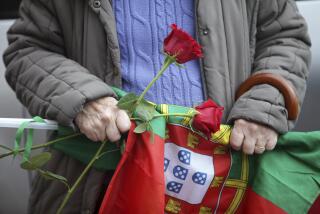Alvaro Cunhal, 91; Led Communist Opposition to Portuguese Dictatorships
- Share via
Alvaro Cunhal, who led Portugal’s Communist Party for half a century and became a national hero after the overthrow of the country’s dictatorship, died Monday, the party said. He was 91.
The party announcement did not indicate where Cunhal died or the cause of death.
The government declared a national day of mourning Wednesday, the day of Cunhal’s funeral in Lisbon.
Cunhal spent nearly 35 years underground or in jail for his role in building the Communists into the only well-organized opposition to the dictatorships of Antonio Salazar and then Marcelo Caetano. He was living in exile in Moscow when a bloodless 1974 army coup known as the Revolution of Carnations overturned Caetano’s government.
President Jorge Sampaio said Cunhal “has his place among us in the fight against the authoritarian regime, in the revolution and the consolidation of Portuguese democracy.”
When Cunhal returned from exile after the coup, his party’s showing in elections propelled him into ministerial posts in four provisional, military-led governments.
But he was unable or unwilling to soften his austere style to broaden his support, and the country’s leftist sympathies focused on Mario Soares and the Socialists.
Cunhal was a strong candidate for prime minister in 1975. With support from the Soviet Union, his party won 20% in a national ballot.
He wanted Portugal to pull out of NATO and become an ally of Moscow.
Cunhal applauded the Soviet invasion of Czechoslovakia in 1968, praised the Soviet war effort in Afghanistan and rejected the reforms of Soviet leader Mikhail Gorbachev.
He clung to his communist ideals long after the Soviet perestroika of the 1980s and, perhaps as a consequence, the party’s influence gradually faded.
Its 7% share of the vote in the 2002 general election was its lowest point.
Cunhal was a charismatic and imposing figure, even in his later years, with white hair, jet-black eyebrows and intense black eyes.
He retired in 1993, making way for Carlos Carvalhas, who had been groomed as his successor.
Born in Portugal’s Coimbra district, Cunhal entered communism from a comfortable, middle-class family.
He studied law and graduated first in his class at Lisbon University.
He secretly joined the outlawed Communist Party at the university.
In 1960, when Cunhal was incarcerated in the dictatorship’s top-security Peniche prison, he and nine other political prisoners escaped by tying bedsheets together. Cunhal was hailed as a national hero when he returned to Lisbon after 14 years in exile.
Cunhal was a private man who kept much of his life secret. But a few years ago, he revealed he was the author of several top-selling novels under the pseudonym Manuel Tiago.
His pencil drawings done in jail also won praise.
Cunhal is survived by his partner, Fernanda Barroso; and a daughter from a previous relationship.
More to Read
Sign up for Essential California
The most important California stories and recommendations in your inbox every morning.
You may occasionally receive promotional content from the Los Angeles Times.













